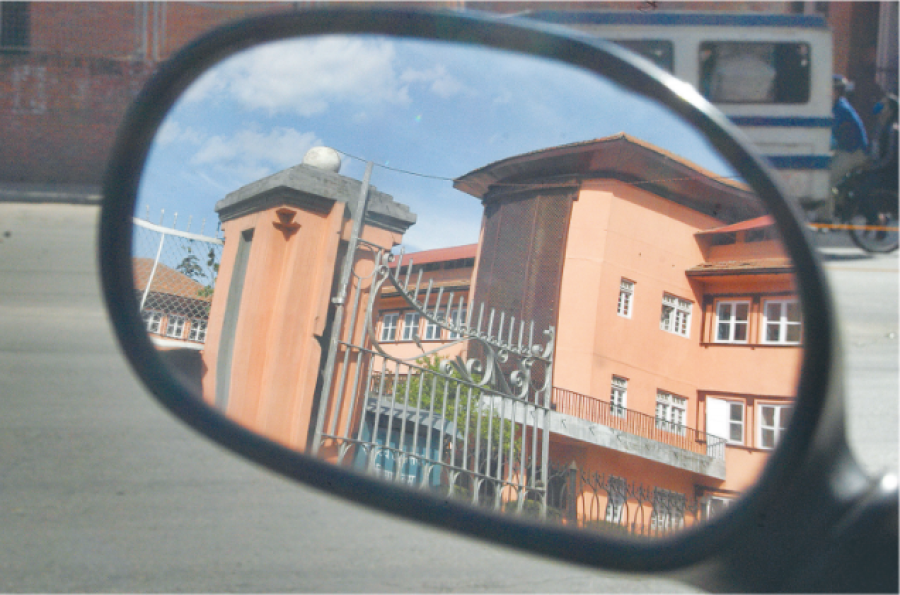National
Composition of Constitutional Bench questioned as hearing on House dissolution begins
Plaintiffs’ lawyers say Shrestha’s presence constitutes conflict of interest as he was part of the bench that invalidated Nepal Communist Party (NCP) in March.
Binod Ghimire & Tika R Pradhan
The Constitutional Bench constituted to conduct hearings on the petitions challenging the dissolution of the House of Representatives has run into controversy after the lawyers representing 146 lawmakers of the dissolved House questioned the presence of Justice Bam Kumar Shrestha in the five-member bench.
Prior to the hearing that began on Friday, Chief Justice Cholendra Shumsher Rana picked Justices Deepak Kumar Karki, Ananda Mohan Bhattarai and Tej Bahadur KC along with Shrestha as members of the bench.
Lawyers have questioned the presence of Justice Shrestha saying it constituted a serious conflict of interest because the latest House dissolution was the result of Shrestha’s order to invalidate the Nepal Communist Party and revive the CPN-UML and the Communist Party of Nepal (Maoist Centre).
Ruling on a three-year old case, a division bench of Justices Kumar Regmi and Shrestha on March 7 had passed its judgment in favour of Rishiram Kattel, who had challenged the Election Commission’s decision to award the Nepal Communist Party (NCP) name, NCP within brackets, to KP Sharma Oli and Pushpa Kamal Dahal, saying that Nepal Communist Party had already been registered under Kattel’s name back in 2013.
The decision also invalidated the May 2017 formation of the Nepal Communist Party (NCP) and took the constituent parties to their pre-merger state. The UML and Maoist Centre had merged in May 2018 to form the Nepal Communist Party (NCP).
During Friday’s hearing, senior advocate Govinda Bandi argued that Shrestha shouldn’t be part of the bench as the petitions related to the dissolution were somehow connected with the verdict to revive the UML and the Maoist Centre. His statement was supported by advocates Shambhu Thapa and Tika Ram Bhattarai.
The verdict to revive the UML and the Maoist Centre had been criticised as politically motivated by many including the Madhav Nepal and Jhala Nath Khanal-led faction of the UML and the Pushpa Kamal Dahal-led Maoist Centre, who said the bench gave more than what the petitioner had demanded.
Chief Justice Rana on Friday, however, defended his selection, saying justices are independent and the defendants too can raise similar questions about another justice and therefore everyone should trust justices.
“You have to trust the justices and believe in their impartiality,” said Rana.
Presenting his counterarguments, Attorney General Ramesh Badal raised ethical questions against Thapa, Bandi and Bhattarai for offering suggestions to Speaker Agni Sapkota—one of the defendants.
On Thursday, a number of lawyers including Thapa, Bandi and Bhattarai, who all are pleading on behalf of the opposition alliance, were invited by the Speaker for suggestions on possible moves he could make in the wake of the House dissolution.
Some legal practitioners have suggested that Sapkota can use his discretionary power to revive the House. Sapkota had held similar consultations with legal experts in December last year also, after Oli dissolved the House.
Experts on constitutional matters had told the Post then that there is no constitutional provision enabling the Speaker to restore the House and that if he did so somehow, it would be yet another unconstitutional move.
The Constitutional Bench during Friday’s hearing could not delve much into the petitions and demands as discussions were caught up in ethical questions.
A court official said the hearing will resume on Sunday.
The lawyers representing the plaintiffs have, however, demanded time from the bench to present their arguments why Shreshta shouldn’t be part of the bench.
“It’s a serious conflict of interest and we will continue to raise the issue unless Chief Justice Rana replaces Justice Shrestha with a senior Justice of the Supreme Court,” said senior advocate Shambhu Thapa. “There are 14 justices on the roster. The chief justice can replace Shrestha with any one of them.”
In the order of precedence, Shrestha ranks 12th among the 20 Supreme Court justices.
Last year too when Oli’s December 20 dissolution of the House of Representatives was challenged in the Supreme Court, the composition of the Constitutional Bench had been dragged into controversy when Rana inducted Justice Hari Krishna Karki, who had served as Attorney General in the Oli government in 2015, into the Constitutional Bench.
Karki later decided to recuse himself from the bench. Justice Sapana Pradhan Malla was brought to the bench in place of Karki.
The other justices in the Constitutional Bench to hear the petitions against House dissolution were Bishowambhar Prasad Shrestha, Anil Kumar Sinha and Tej Bahadur KC.
Chief Justice Rana has repeated Justice KC this time also.
As many as 30 petitions, including the one by the five-party opposition alliance, have been filed challenging the May 21 dissolution.
After a preliminary hearing on 19 petitions on Thursday, a single bench of Rana sent them to the Constitutional Bench. The remaining 11 were directly registered at the Constitutional Bench.
The petitioners, who had directly registered their petitions to the Constitutional Bench, presented their opening remarks on Friday. Half of them put their arguments on Friday, according to Kishor Poudel, a communication expert at the Supreme Court.
The Constitutional Bench is a constitutionally envisioned bench which is led by the chief justice with the prerogative to select members from a roster of senior justices.
President Bidya Devi Bhandari late last Friday night dissolved the Parliament on the recommendation of Prime Minister KP Sharma Oli. Earlier on Friday evening, Bhandari had rejected the claims of both Oli and Deuba for the prime ministerial post, saying the “claims were insufficient”.
The President called snap polls on November 12 and 19 on Oli’s recommendation.



 20.53°C Kathmandu
20.53°C Kathmandu
















